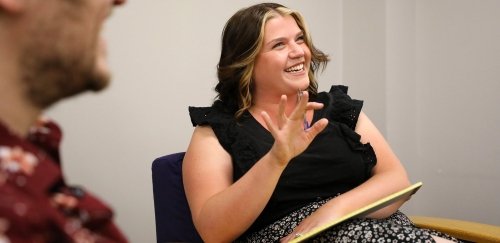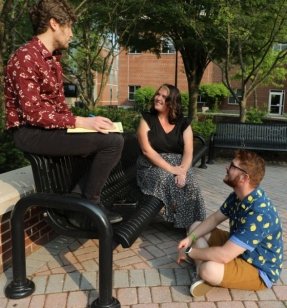
Master of Social Work
Have a commitment to social justice, an ability to think critically, and a natural talent for helping? Join our newest program that builds on these natural talents to train the next generation of master’s level social workers.
- Degrees & Offerings
-
- M.S.W.
- Location
-
- Bloomsburg
- Program Contact
-
MSW Program Director and Associate Professor
MSW Virtual Alumni Panel Discussion
You're invited to the upcoming Master of Social Work (MSW) Virtual Alumni Panel Discussion on Thursday, April 17th at 6 p.m. on Zoom! Join recent MSW graduates as they preview the MSW student experience, coursework, life as a graduate student, job experiences, and more! Registration and additional details available below.
Do you have passion for helping others?
Not only is the need for licensed social workers predicted to grow over the next 10 years, but our current economic, health care, and social crises unfortunately highlight the need for social workers. We're a profession that's charged with advocating for, empowering, and assisting those in society who are most oppressed. Often, this means supporting children and families living on the margins; however, we're also charged with strengthening social systems and support networks so that no one is denied basic human rights.
Program Overview

- Program Options: The MSW program has two options for students based on their undergraduate degree:
>> 2-Year Program: This is a two-year program for people who've earned bachelor’s degrees, not limited to just social work. Anyone interested in a career in social work can- and should- apply.
>> Advanced Standing: Applicants with a BSW can apply for “advanced standing.” Those who excelled in their BSW programs may opt out of the foundational year of the program. Advanced standing essentially cuts two semesters off the program. - Program Delivery: Coursework is offered in a flexible, blended-hybrid modality.
- Start Dates: Applications are accepted for the Fall semester (traditional program start) and Summer (optional to begin elective course work).
- Who Should Apply: Great fit for students from any undergraduate major. Some of the more common applicant majors are psychology, sociology, education, and criminal justice.
- Program Flexibility: Full-time and part-time options available.
- MSW Curriculum: Because this MSW curriculum is standardized, you'll be eligible for professional licensure in Pennsylvania, as well as the rest of the United States. You'll receive advanced generalist training for helping professionals working in a number of practice settings, such as school systems, behavioral health institutions, medical settings, and child welfare agencies.
- CSWE Accreditation: The Commonwealth University Master of Social Work program has been awarded full accreditation through the Council on Social Work Education (CSWE).
Courses and Curriculum
- Diverse Career Opportunities: With an MSW, you can work in various sectors such as healthcare, education, child welfare, mental health, and community organizations. The degree opens doors to roles like clinical social worker, policy analyst, or program director.
- High Demand for Skills: The world is constantly evolving, and so are the needs of its people. Trained social workers are in high demand to address issues ranging from mental health crises to social justice advocacy. Social work is a steadily growing field. According to the Bureau of Labor Statistics, employment for social workers is projected to grow much faster than the average for all occupations, offering strong job security and growth potential.
- Career Opportunities and Advancement: An MSW opens doors to a broad range of career opportunities in diverse settings, including healthcare, education, community organizations, and government agencies. The degree also provides a platform for advanced positions and specializations, such as clinical social work, school social work, and social work administration.
- Making a Difference: Social work is a profession dedicated to helping individuals, families, and communities deal with challenges and improve their well-being. With an MSW, you can make a tangible impact on people's lives and contribute positively to society by addressing issues such as mental health, substance abuse, homelessness, and inequality.
- Advanced Clinical Skills: The MSW program will provide you with advanced skills in assessment, intervention, and case management, enabling you to effectively support and advocate for your clients.
- Licensure and Certification: Many MSW programs offer specialized training in clinical practice, preparing you to become a licensed Clinical Social Worker (LCSW). This certification enables you to provide therapy and mental health services, expanding your career options significantly.
The accelerated MSW pathway allows students from any major to use MSW classes towards upper-level undergraduate coursework. Students participating in the MSW Accelerated Pathway should meet the following qualifications:
- Must be a Commonwealth University student
- At least junior or senior status
- Any major
- 3.0 GPA or above
- Complete the MSW Graduate Admissions Application
- If accepted, students will be enrolled as provisional admission
- Secure Advisor approval
Provisional admission: Students participating in the Accelerated MSW Pathway will need to maintain the following while participating in the program:
- Maintain a cumulative GPA of 3.0 or higher
- Graduate with an undergraduate cumulative GPA of 3.0 or higher
- Achieve a B+ or higher in MSW courses taken
Degree Requirements Degree Works
Note: Degree requirements effective for enrolled students beginning Fall 2023. All enrolled students, including matriculating students prior to Fall 2023, can review their degree program requirements and track progress to degree completion with our degree audit and advisement tool, Degree Works.
- Applicants must have an earned baccalaureate degree from a college or university accredited by a recognized U.S. regional accrediting association or an equivalent degree from an institution outside the U.S.
- Grade Point Average: A minimum GPA of at least 3.0 on a 4.0 scale is required. Following Commonwealth University guidelines, applicants with a GPA of 2.7 to 2.99 may be considered for provisional acceptance.
- Application Statement: Applicants must submit a statement that addresses the following. The statement should be no more than five double-spaced pages and address each item. This statement will be reviewed for content and writing quality:
- Why have you chosen social work as a profession?
- What are your goals in pursuing an MSW?
- How are your values consistent with the ethical principles of social work as articulated by the National Association of Social Workers?
- What is your experience working or volunteering in a helping capacity?
- What is your experience working with diverse groups of people?
- What will be your greatest challenges in pursuing a master’s degree in social work?
- Resume: Applicants will provide a resume that includes both volunteer and paid experience.
- References: Applicants will provide the names and contact information of three professional references who will then be contacted to provide letters of recommendation. One reference will be from a current or recent employer, and one will be from an educational setting. References from personal relationships will not be accepted.
- Life Experience: As per the guidelines of our accrediting body, the Commonwealth MSW program does not give academic credit for life experience.
- Criminal Record: A criminal record will exclude potential students from some areas of social work practice. Applicants with a criminal record should consult with the Program Director as part of their application process. All students will be required to complete criminal background checks after being admitted to the Program.
- Credit for BSW Classes: Prospective students who have completed undergraduate social work coursework, but do not qualify for advanced standing, may apply for exemption to first year equivalent MSW classes that they earned at least a B in.
- Transfer Credits: Students who are accepted to the program may transfer primary social work courses from a CSWE accredited MSW program. Electives may be transferred from other applicable graduate programs. These credits must have been earned in the past five years while the student was in good standing in the academic program. Only grades of a B or higher will be accepted for transfer. Pass/fail grades are not accepted. Workshop or otherwise condensed courses will not be accepted. CU policy limits the transfer of graduate credits to nine. However, this limit may be increased with the approval of the Dean of Graduate Studies. If you wish to apply for a waiver, please inquire with the MSW Program Director.
Advanced Standing Admissions
Students who are accepted into the advanced standing program will complete only the Specialized Curriculum (second year) in order to earn an MSW. All general admissions criteria apply with the following changes:
- Undergraduate degree in social welfare or social work: Applicants must have an earned undergraduate degree (BSW, BA, BS) from a CSWE accredited baccalaureate program. Additionally, BSW programs recognized through CSWE’s International Social Work Degree Recognition and Evaluation Services, or that are covered under a memorandum of understanding with international social work accreditors will be accepted. All applicants must have earned a 3.2 in their major (on a 4.0 scale) in order to be eligible for advanced standing. Applicants without a 3.2 GPA but with unusual circumstances may be considered for admission for advanced standing when they provide a written argument for exception to this requirement in the admissions essay.
- References: Applicants will provide the names and contact information of three professional references who will then be contacted to provide letters of recommendation. References from personal relationships will not be accepted. One reference must be from a BSW field supervisor, liaison, or field faculty. At least one reference must be from a BSW faculty member.
- Advanced standing students with a BSW degree earned 5 or more years prior to application, who have issues or concerns related to submitting their BSW Internship Evaluation and/or acquiring a reference from their field supervisor, liaison, or faculty, should still apply, Please reach out to the Program Director or MSW Field Director for guidance and information on alternate documentation.
- Advanced standing applicants will also submit a copy of their final BSW field internship evaluation.
Admission Process
- Application Materials: Prospective students will submit materials via the School of Graduate Studies application portal. Information on how to apply can be found there. Application materials include: transcripts from undergraduate work; personal statement; resume; references, and admissions fees.
- Application Dates: Application materials will be evaluated on a rolling basis with a final deadline of May 5 for the Summer semester and August 5 for the Fall semester. Applications will be accepted until this date, or until the program is full.
- Evaluation of Material: The Social Work Admissions Committee will evaluate completed admissions packets on a rolling basis. Students will be informed of the outcome of their application in a timely fashion via their provided email address.
There are three outcomes to the application:
- Accepted Students are applicants who are approved to begin the program at the next starting date. Accepted Students who wish to defer beginning the program should consult with the program director.
- Provisionally Accepted Students are applicants who meet most, but not all, admissions criteria and must agree in writing to the terms of provisional admission (e.g. maintain GPA, complete missing undergraduate coursework) and timeline for completion (e.g. by the end of the first semester, by the time the program begins, etc.) in order to begin the program. Provisionally Accepted Students understand that they will not be allowed to begin or continue in the program if they do not meet the specific requirements set out by the Admissions Committee. Once the provisional requirements have been met, the Provisionally Accepted Student’s status will be updated to Accepted Student.
- Applicants who are not accepted for admission may reapply after consultation with the program director.
- Q: Do I need a degree in social work to be admitted?
A: No- it’s an excellent fit for students from any undergraduate major. Some of the more common applicant majors are psychology, sociology, education, and criminal justice. - Q: How are classes offered?
A: Courses are primarily delivered in person at the Bloomsburg campus. We are committed to providing accessibility to returning students and offer classes in the evening to accommodate work, family, and life commitments. Beginning Spring 2024 – online options for starting the program. - Q: What is the requirement for field practicum?
A: In the first year of the program, students complete 400 hours of field work over two semesters in the same agency. Second year students complete 450 hours during that year in a different agency. Students may be approved for an employment based practicum if they are already working in a social service agency. Graduate assistantships are also available through the Social Work Program. - Q: What are my career options with an MSW?
A: Social workers are needed in a variety of different professional settings, including mental health, child welfare, criminal justice, community development, healthcare, and education. - Q: What is the job outlook for social workers?
A: With the renewed emphasis on social support and mental health, both regionally and nationally, the demand for social workers is estimated to continue to grow at a faster rate than other professions. - Q: What is the Advanced Standing Program?
A: This is for applicants who have an undergraduate degree in social work. If accepted into this option, they are essentially eligible to waive the requirements of the first year of the program and complete the MSW in about 11 months (BSW + 36 credits). - Q: When can I start?
A: Applications are accepted for the Summer semester. - Q: Do I need to take the GRE in order to apply?
A. No- the GRE is not required for admission.
Field Education is the Signature Pedagogy of Social Work Education, and is intended to provide students the opportunity to apply models, theories, and ethical concepts learned in the classroom to a variety of community practice settings.
Commonwealth University- Bloomsburg Social Work program has relationships with many community agencies and organizations that allow students to gain meaningful practice experience with individuals, families, groups, communities, and organizations. Possible internship settings include, but are not limited to, hospitals and other medical facilities, schools, county child welfare organizations, behavioral health and addiction treatment programs, juvenile and adult corrections programs, community service organizations, university-based student services and research programs, and programs that serve veterans and older adults.
The Council on Social Work Education requires that MSW students complete at least 900 hours of field experience in an appropriate practice setting in order to earn their degree.
Traditional, two-year program students will participate in four semesters of Field, in two different agencies or practice settings, in order to meet this requirement. Advanced Standing students will participate in two semesters of Field. Since these students bring at least 400 hours of field experience with them from their undergraduate programs, they will complete a minimum of 500 hours in an appropriate advanced generalist setting.
Students will work with the Field Director to secure their field placements. While this process is collaborative, all internship sites must be vetted and approved by the Field Director before a placement can be finalized. Details on this process, and other Field Education Policies and Procedures, will be available in the Field Education Manual.
- Competency 1 – Demonstrate Ethical and Professional Behavior
- a. Make ethical decisions by applying the standards of the NASW Code of Ethics, relevant laws and regulations, models for ethical decision-making, ethical conduct of research, and additional codes of ethics as appropriate to context
- b. Use reflection and self-regulation to manage personal values and maintain professionalism in practice situations
- c. Demonstrate professional demeanor in behavior; appearance; and oral, written, and electronic communication
- d. Use technology ethically and appropriately to facilitate practice outcomes e. Use supervision and consultation to guide professional judgment and behavior.
- Competency 2 - Engage Diversity and Difference in Practice (EPAS 2.1.2)
- a. Apply and communicate understanding of the importance of diversity and difference in shaping life experiences in practice at the micro, mezzo, and macro levels
- b. Present themselves as learners and engage clients and constituencies as experts of their own experiences
- c. Apply self-awareness and self-regulation to manage the influence of personal biases and values in working with diverse clients and constituencies.
- Competency 3 - Advance Human Rights and Social, Economic, and Environmental Justice (EPAS 2.1.3)
- a. Apply their understanding of social, economic, and environmental justice to advocate for human rights at the individual and system levels
- b. Engage in practices that advance social, economic, and environmental justice.
- Competency 4 - Engage in Practice-Informed Research-Informed Practice (EPAS 2.1.4)
- a. Apply critical thinking to engage in analysis of quantitative and qualitative research methods and research findings
- b. Use and translate research evidence to inform and improve practice, policy, and service delivery.
- Competency 5 - Engage in Policy Practice (EPAS 2.1.5)
- a. Identify social policy at the local, state, and federal level that impacts well-being, service delivery, and access to social services
- b. Assess how social welfare and economic policies impact the delivery of and access to social services
- c. Apply critical thinking to analyze, formulate, and advocate for policies that advance human rights and social, economic, and environmental justice.
- Competency 6 - Engage with Individuals, Families, Groups, Organizations, and Communities
- a. Apply knowledge of human behavior and the social environment, person-in environment, and other multidisciplinary theoretical frameworks to engage with clients
- b. Use empathy, reflection, and interpersonal skills to effectively engage diverse clients and constituencies.
- Competency 7 - Assess Individuals, Families, Groups, Organizations, and Communities (EPAS 2.1.7)
- a. Collect and analyze data, and apply critical thinking to interpret information from clients and constituencies
- b. Apply knowledge of human behavior and the social environment, person-in environment, and other multidisciplinary theoretical frameworks in the analysis of assessment data from clients and constituencies
- c. Develop mutually agreed-on intervention goals and objectives based on the critical assessment of strengths, needs, and challenges within clients and constituencies
- d. Select appropriate intervention strategies based on the assessment, research knowledge, and values and preferences of clients and constituencies.
- Competency 8 - Assess Individuals, Families, Groups, Organizations, and Communities (EPAS 2.1.7)
- a. Collect and analyze data, and apply critical thinking to interpret information from clients and constituencies
- b. Apply knowledge of human behavior and the social environment, person-in environment, and other multidisciplinary theoretical frameworks in interventions with clients and constituencies
- c. Use inter-professional collaboration as appropriate to achieve beneficial practice outcomes
- d. Negotiate mediate, and advocate with and on behalf of diverse clients and constituencies
- e. Apply evaluation findings to improve practice effectiveness at the micro, mezzo, and macro levels.
- Competency 9 - Evaluate Practice with Individuals, Families, Groups, Organizations, and Communities (EPAS 2.1.9)
- a. Select and use appropriate methods for evaluation of outcomes
- b. Apply knowledge of human behaavior and the social environment, person-in environment, and other multidisciplinary theoretical frameworks in the evaluation of outcomes
- c. Critically analyzet, monitor, and evaluate the intervention and program processes and outcomes
- d. Apply evaluation findings to improve practice effectiveness at the micro, mezzo, and macro levels.
ADDITIONAL INFORMATION
Licensure and Certification
Professional licensure laws and regulations vary from state to state and are subject to change without notice. If you are planning to pursue a professional credential in a state other than PA, it is highly recommended that you contact the appropriate state licensing agency to seek guidance and verify requirements. In states that provide licensure for master’s level social workers, an MSW degree from a CSWE accredited program is one of the requirements for licensure. While our program will meet this standard, we have not independently verified licensure requirements in all states. Visit our state authorization page for details.
ONWARD AND UPWARD
Careers
Nationally, the demand for social workers is estimated to continue to grow at a faster rate than other professions. Career options include:
Potential Job Opportunities
- Clinical Social Worker
- School Social Worker
- Medical Social Worker
- Community Outreach Coordinator
- Human Services Administrator
- Policy Analyst or Advocate
- Child and Family Social Worker
- Mental Health and Substance Abuse Counselor
- Therapist
- Behavioral Health Specialist
Program Faculty
Applying to Graduate Programs
Apply
-
Application Process
Review the step-by-step application process for graduate school at Commonwealth University.
-
Apply Now
By starting your application, you gain access to your personalized application portal to view your progress.
-
Contact Us
If you have questions, we have answers. Contact us today!
Explore More
-
Grad Assistantships
Help finance your grad degree. Gain professional experience. Grow your network.
-
Tuition and Fees
Earning an advanced degree is an investment in your future. See just how affordable a graduate degree can be for you.
-
Understanding Financial Aid
Our Financial Aid team is your guide to navigating the aid process for your graduate degree.






